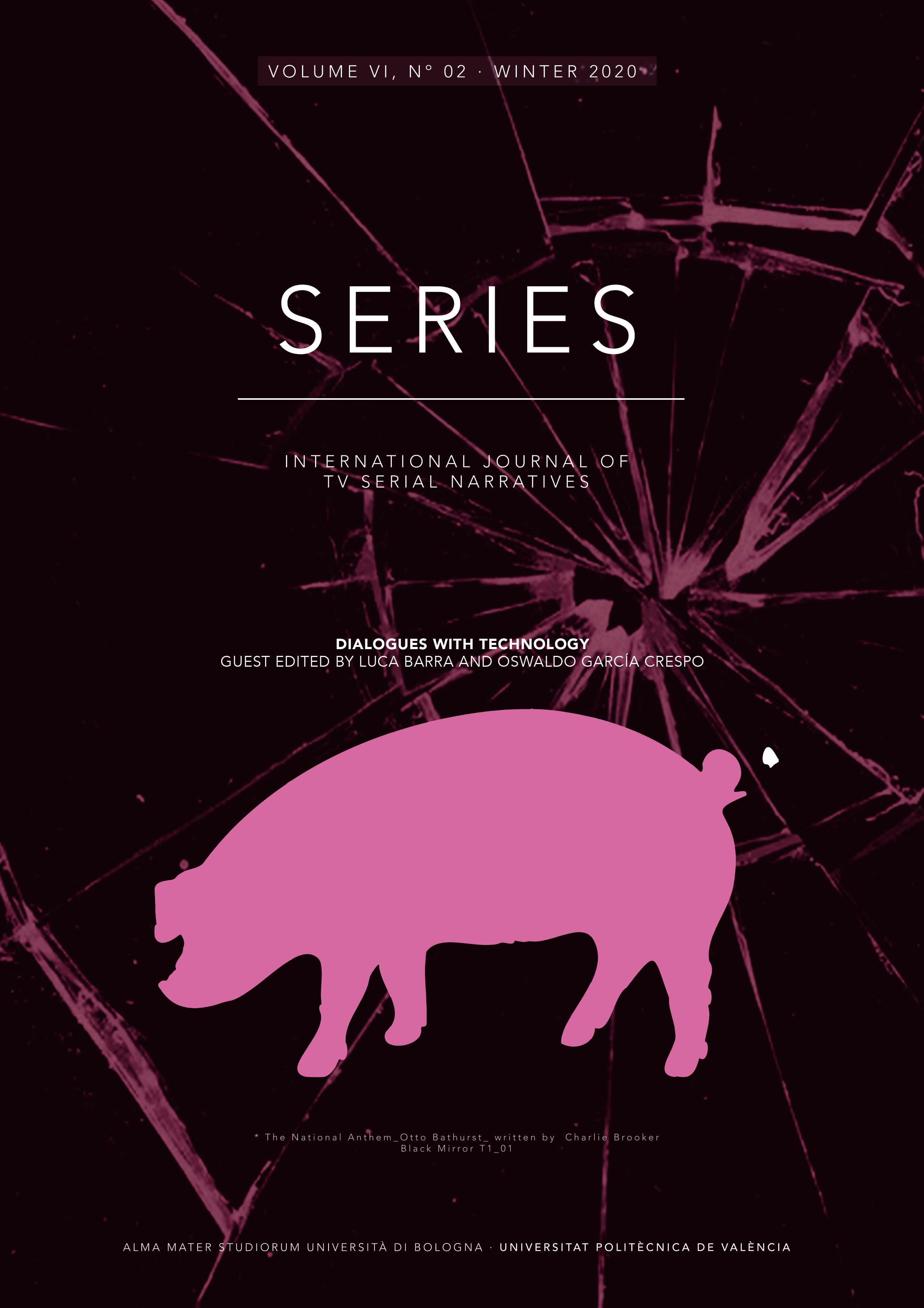The Deutschland83 miniseries. Technological representation of the Cold War between Ostalgie, vintage mood and Vergangenheitsbewältigung
DOI:
https://doi.org/10.6092/issn.2421-454X/11511Keywords:
technology, serial, transmedia, Cold War, GermanyAbstract
The article analyzes the German television series Deutschland83 on air, not only in Germany, since 2015. The author wants to demonstrate how the use of representation in the eight episodes of the series of numerous technological objects from the Cold War period represents a way to tell in Germany's recent past before reunification to a new generation audience. From a methodological point of view, the article leans on semiotic and cultural studies themes, analyzing for each episode which type of technological object is highlighted by the plot and why. In the article neither the historical reconstruction nor the summary of the eight episodes of the series are left out.
The vintage technological objects present in the Deutschland83 series can be divided into objects of common use and objects not of common use: in the first case, the objects have the task of historically contextualizing the series, in the second case, the objects not of common use they have the task of influencing the whole plot centered on the espionage activities of the protagonist Martin / Mortiz and his attempt to thwart nuclear war.
References
Ahbe, Thomas (2005). Ostalgie. Zum Umgang mit der DDR-Vergangenheit in den 1990er Jahren. Erfurt: Landeszentrale für politische Bildung Thüringen.
Ahbe, Thomas (2016). Ostalgie. Zu ostdeutschen Erfahrungen und Reaktionen nach dem Umbruch. Erfurt: Landeszentrale für politische Bildung Thüringen.
Arenhövel, Mark (2000). Demokratie und Erinnerung, Der Blick zurück auf Diktatur und Menschenrechtsverbrechen. Frankfurt: Campus.
Banchelli, Eva (2006). Taste the East. Linguaggi e forme dell’Ostalgie. Bergamo: Sestante.
Battis, Ulrich, Jakobs, Jesse and Isensee (1992). Vergangenheitsbewältigung durch Recht, Drei Abhandlungen zu einem deutschen Problem. Berlin: Duncker & Humblot.
Berry, David (2020). On nostalgia. Toronto: Coach House Books.
Brogelli Hafer, Donatella and Gengaroli-Bauer (2011). Italiani e tedeschi: aspetti di comunicazione interculturale. Rome: Carocci.
Cooke, Paul (2005). Representing East Germany since Unification. From Colonization to Nostalgia, Oxford: Bloomsbury.
Garofalo, Lara (2012). Ostalgie: ein Phaenomen der Erinnerung. Venice: Università Cà Foscari.
Giordano, Ralph (1987). Die zweite Schuld oder Von der Last ein Deutscher zu sein. Cologne: KiWi.
Gislimberti, Tiziana (2007). “Ostalgie, ovvero nostalgia del passato perduto. A proposito dell’identità tedesca orientale.” Metabasis. Rivista di filosofia on-line 2(4): 1-21.
Gislimberti, Tiziana (2009). Mappe della memoria. L’ultima generazione tedesco-orientale si racconta. Milan: Mimesis.
Herberg, Dieter, Kinne and Steffens (2004). Neuer Wortschatz: Neologismen der 90er Jahre im Deutschen. Berlin: De Gruyter.
Holdsworth, Amy (2011). Television, Memory, and Nostalgia. London: Palgrave MacMillan.
König, Helmut (1998). Von der Diktatur zur Demokratie oder Was ist Vergangenheitsbewältigung. Berlin: Springer.
Krauß, Florian (2020). “When German Series Go Global: Industry Discourse on the Period Drama Deutschland and its Transnational Circulation.” VIEW Journal of European Television History & Culture 9(17): 1-12. http://doi.org/10.18146/view.212.
Lizardi, Ryan (2015). Mediated Nostalgia: Individual Memory and Contemporary Mass Media. Washington, D.C.: Lexington Books.
Maj, Barnaba (2015). Heimat: la cultura tedesca contemporanea. Rome: Carocci.
Neller, Katja (2006). DDR-Nostalgie. Dimensionen der Orientierungen der Ostdeutschen gegenüber der ehemaligen DDR, ihre Ursachen und politischen Konnotationen. Wiesbaden: Springer-Verlag.
Niemeyer, Katharina (2014). Media and Nostalgia: Yearning for the Past, Present and Future. London: Palgrave MacMillan.
Miller, Daniel (2010). Stuff. Cambridge: Polity.
Panosetti, Daniela and Pozzato (2013). Passione vintage: il gusto per il passato nei consumi, nei film e nelle serie televisive. Rome: Carocci.
Pollack, Detlef (2003) “Ostdeutsche Anerkennungsprobleme. Autobiographische Erfahrungen in
soziologischer Perspektive.” Vorgänge 42(1): 4-13.
Propp, Vladimir Ja. (2001). Morfologija volshebnoj skazki. Moscow: Labirint.
Reynolds, Simon (2011). Retromania: Pop Culture's Addiction to Its Own Past. New York: Farrar Straus & Giroux.
Sánchez, G.H. (2012). Ceramics and the Spanish Conquest: Response and Continuity of Indigenous Pottery Technology in Central Mexico. Leiden: Sidestone.
Vannuccini, Vanna and Francesca Predazzi (2004). Piccolo viaggio nell’anima tedesca. Milan: Feltrinelli.
Violi, Patrizia (2014). Paesaggi della memoria: Il trauma, lo spazio, la storia. Milan: Bompiani.
Wirth, Björn (2004). “RTL-Comedy über "Meine schönsten Jahre" in der DDR: Fahnenappell und Westpaket”. Berliner Zeitung. https://www.berliner-zeitung.de/rtl-comedy-ueber-meine-schoensten-jahre-in-der-ddr-fahnenappell-und-westpaket-li.71896 (last accessed 15-11-20).
TV series and other media cited
Die Andere Heimat - Chronik einer Sehnsucht (2013)
Ansichten eines Clowns (1963)
Die Blechtrommel (1959)
Deutschland83 (2015)
Deutschland86 (2018)
Deutschstunde (1968)
Das Erbe der Nazis (2015-2016)
Go Trabi Go – Die Sachsen kommen (1991)
Go Trabi Go 2 – Das war der wilde Osten (1992)
Good Bye, Lenin! (2003)
Großstadtrevier (1986-)
Heimat – Eine deutsche Chronik (1984)
Heimat 3 - Chronik einer Zeitenwende (2004)
Meine schönsten Jahre (2004)
Der Nazi und der Friseur (1971)
Sonnenallee (1999)
“Space Oddity” (1968)
Tannbach - Schicksal eines Dorfes (2015-2018)
“Todesfuge” (1948)
Unorthodox (2020)
Unser Auschwitz (1965)
Der Verdacht (1950)
Das Versprechen (1994)
Wir sind jung. Wir sind stark (2014)
Die zweite Heimat - Chronik einer Jugend (1992)
Downloads
Published
How to Cite
Issue
Section
License
Copyright (c) 2020 Francesca Di Tonno

This work is licensed under a Creative Commons Attribution 3.0 Unported License.




